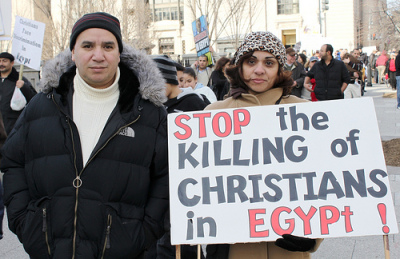Persecuted Middle Eastern Christians Gain Overwhelming Support in US House of Representatives

The House of Representatives has approved bipartisan legislation to diplomatically address the current plight of Middle Eastern and Central Asian Christians.
The House approved the creation of a special envoy at the U.S. State Department for religious minorities in the Near East and South Central Asia by a vote of 402-22.
Todd Nettleton, a spokesperson for Voice of the Martyrs, a group that advocates for the rights of persecuted Christians, expressed cautious optimism about the proposal.
"I'll be interested to see where this goes from here, because the Senate will have to approve it," Nettleton told The Christian Post. "I'm also unclear how it is different than the United States on International Religious Freedom and the State Department's work. It's interesting, I'm just curious what all the logic behind it is."
"Anything that gets more attention to the issue of Christian persecution is a good thing. It's just unclear to me how it fits in with the other offices that the government has in place, in proposing responses to the American government," he added.
Nettleton also explained that a envoy's ability to affect change depended on her or his ability to affect inter-religious interactions on the ground.
"Can we really make a difference on the ground? What steps would we have to take to make a functional difference on the ground in Egypt, Iraq, Syria?" said Nettleton. "That's not a question that one envoy can answer, that's a question that needs to be discussed, explored, answered and involves foreign policy, military policy, foreign aid. The more attention these issues get the better but is appointing an envoy going to solve all those problems? It's too big for any one person to tackle by themselves."
Reps. Frank Wolf (R-VA) and Anna Eshoo (D-CA) originally introduced the bill in 2011, which passed the House with a 402-20 vote, though was blocked in the Senate. They re-introduced the bill at the beginning of 2013.
Wolf sought the support of nearly 300 Protestant and Catholic leaders when he re-introduced it, painting a picture of the current persecution facing the region's Christians and comparing the current response of the church to their indifference during the Holocaust.
"I don't pretend to think that a special envoy will single-handedly solve the problem, but it certainly can't hurt to have a high-level person within the State Department bureaucracy who is exclusively focused on the protection and preservation of these ancient communities," wrote Wolf. "To do nothing is simply not an option."
Since the bill's introduction in January, little has improved for the region's Christians. Last month, Coptic Christians in Egypt suffered the loss or devastating vandalism of over 70 churches and religious institutions. In Syria, Christians in the ancient village of Maaloula have been displaced because of fighting in the town between the Syrian government and rebel forces, and their leaders have been the target of numerous kidnappings by rebels.
Once 20 percent of the region's population in the 20th century, Christians now make up closer to 5 percent.
The envoy will also be charged with advocating for the rights of the Middle East and Central Asia's non-Christian religious minorities — many of whom have often been repressed.
"As we debate this legislation, Coptic Christians are leaving Egypt in droves. As we debate this legislation, seven Baha'i leaders languish unjustly in an Iranian prison as does American citizen Saaed Abedini. As we debate this legislation, Ahmadi Muslims in Pakistan are prohibited from voting and their graves are desecrated," Wolf said yesterday.
"As we debate this legislation, Syrian Christians fear they too will be caught in the crossfire like Iraq's Christians, or worse yet, like Iraq's Jew - that's right, I am told only a single Jew remains in the country where once a vibrant Jewish community flourished," Wolf added.





























